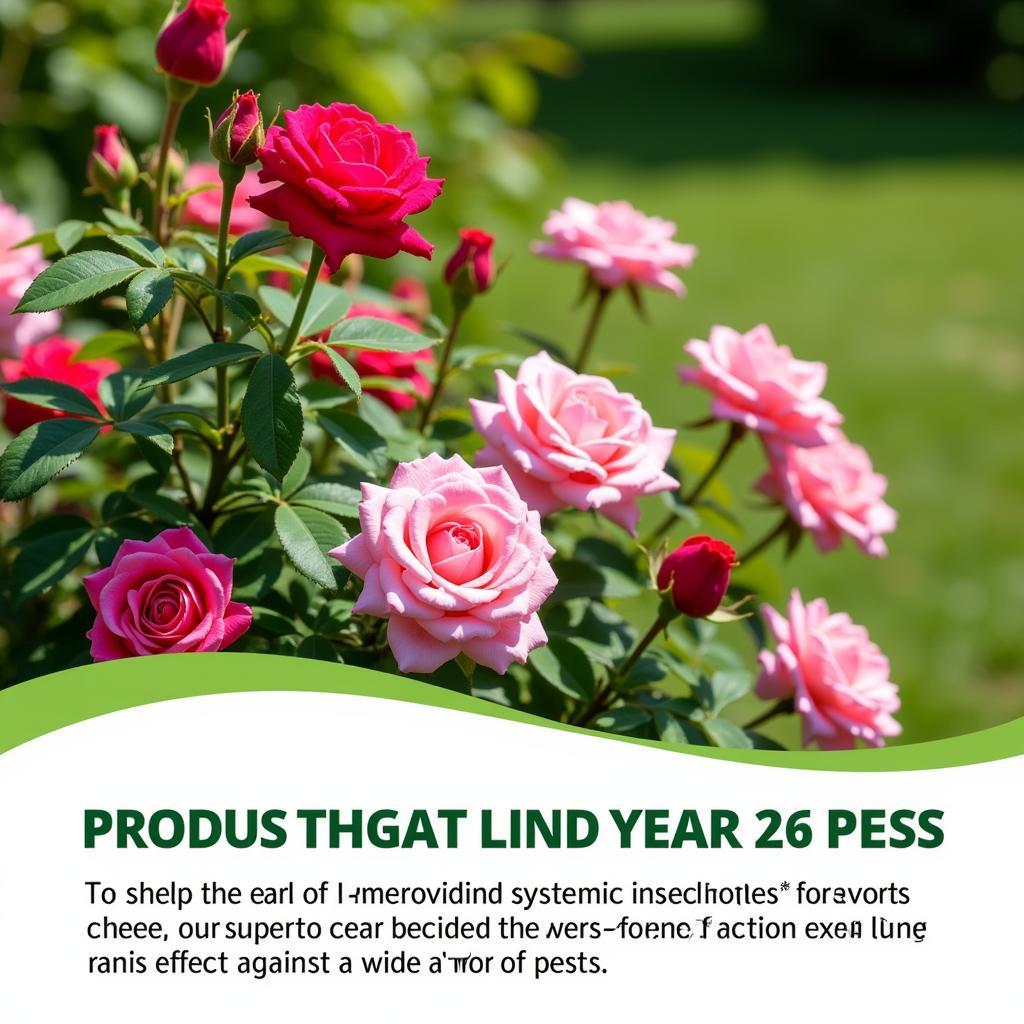Rose Food Systemic Insecticide is a popular choice for protecting beautiful roses from pests. It works by being absorbed into the plant’s system, making the entire rose, from roots to blooms, toxic to insects. This article will delve into the benefits, drawbacks, and safe application of systemic insecticides for your roses.
What is Rose Food Systemic Insecticide?
Systemic insecticides are designed to be absorbed by the plant through its roots or leaves. Once inside, the insecticide circulates throughout the plant’s vascular system, reaching every part, including stems, leaves, flowers, and even new growth. This makes the entire plant poisonous to insects that feed on it, offering comprehensive protection against a wide range of pests. While “rose food” implies a nutritional aspect, the term often refers to systemic insecticides formulated specifically for roses, sometimes combined with fertilizers. These products provide a convenient way to nourish and protect your roses simultaneously.
Benefits of Using Systemic Insecticides for Roses
Using a systemic insecticide can offer several advantages for rose growers. These insecticides offer long-lasting protection, typically for several weeks or even months, reducing the need for frequent applications. They are effective against a broad spectrum of pests, including aphids, spider mites, and whiteflies. Because the insecticide is within the plant, it’s less susceptible to being washed away by rain or irrigation. Finally, systemic insecticides can target pests that are difficult to reach with contact sprays, such as borers that live inside the canes.
Drawbacks and Considerations of Systemic Insecticides
While effective, systemic insecticides also have potential downsides. These insecticides can harm beneficial insects, such as bees and ladybugs, that pollinate plants and control other pests. Overuse can lead to insecticide resistance in pest populations, making them harder to control in the future. Some systemic insecticides can persist in the soil, potentially impacting other plants or even contaminating groundwater. It’s crucial to choose a product appropriate for your region and follow label instructions carefully to minimize these risks.
How to Use Rose Food Systemic Insecticide Safely
Always read and follow the label instructions carefully before applying any insecticide. The label will provide specific information on dosage, application method, and safety precautions. Generally, systemic insecticides for roses are applied as granules sprinkled around the base of the plant or as a liquid drench. Water the area thoroughly after application to help the insecticide reach the roots. Wear gloves and protective clothing when handling insecticides, and avoid applying them on windy days or when rain is expected.
Choosing the Right Rose Food Systemic Insecticide
There are various systemic insecticides available on the market, each with its specific active ingredients and target pests. Some common active ingredients include imidacloprid, acetamiprid, and dinotefuran. When choosing a product, consider the types of pests you are trying to control, the application method, and the potential environmental impact. Look for products specifically labeled for use on roses to ensure compatibility and effectiveness.
“Choosing the right systemic insecticide is crucial. Consider the specific pests you’re dealing with and the potential impact on beneficial insects,” advises Dr. Emily Carter, a horticulturalist specializing in rose cultivation.
Alternatives to Systemic Insecticides
If you’re looking for more environmentally friendly options, consider using insecticidal soap, neem oil, or horticultural oil. These products are less persistent in the environment and have a lower impact on beneficial insects. Regularly inspecting your roses for pests and removing them by hand can also be an effective way to manage infestations before they become severe.
 Healthy Roses After Treatment
Healthy Roses After Treatment
Conclusion
Rose food systemic insecticide can be a valuable tool in protecting your roses from pests and ensuring healthy growth. However, responsible use is essential to minimize potential risks to the environment and beneficial insects. By understanding the benefits, drawbacks, and proper application techniques, you can effectively use systemic insecticides to keep your roses thriving. Remember to always follow label instructions and consider alternative pest control methods when possible.
FAQ
- How often should I apply rose food systemic insecticide?
- What are the signs of insecticide resistance in pests?
- Are there any organic systemic insecticides available for roses?
- Can I use systemic insecticides on other flowering plants?
- How long does it take for a systemic insecticide to become effective?
- What should I do if I accidentally ingest a systemic insecticide?
- How can I protect beneficial insects while using systemic insecticides?
For further assistance, please contact us at Phone Number: 02437655121, Email: minacones@gmail.com Or visit our address: 3PGH+8R9, ĐT70A, thôn Trung, Bắc Từ Liêm, Hà Nội, Việt Nam. We have a 24/7 customer service team.